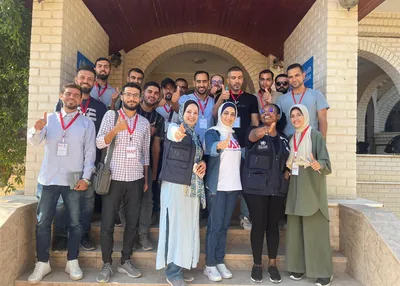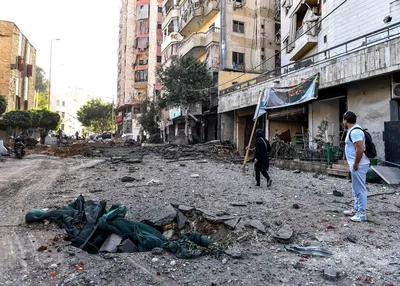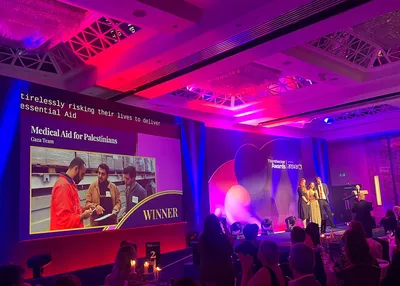“When a Palestinian medical student graduates she is told she can’t legally work in medicine”
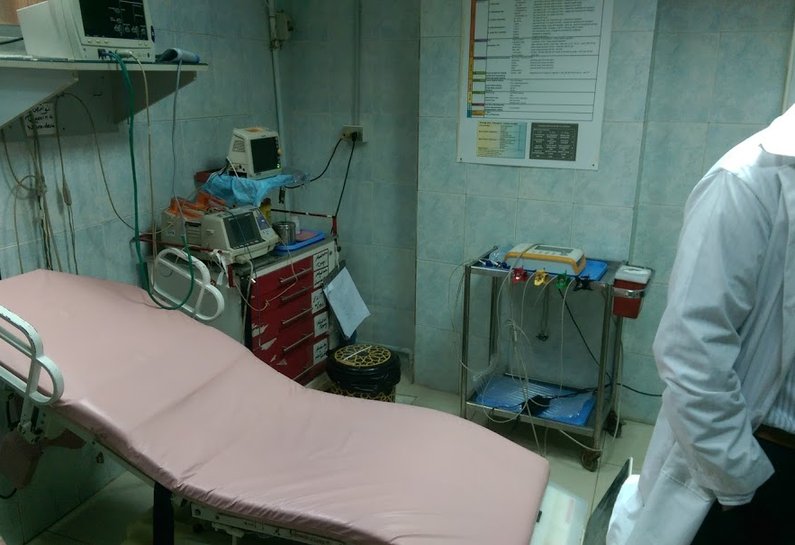
Her story illustrates Medical Aid for Palestinians’ (MAP) new report, Health in Exile, which outlines how 70 years of displacement and marginalisation have undermined the health and dignity of Palestinian refugees in Lebanon. Their dismal socioeconomic conditions and the significant restrictions placed on their rights have created a situation of perpetual humanitarian crisis and dependency on aid and a Palestinian-focused healthcare system which is close to collapse.
Without the freedom to earn an adequate living, a person’s ability to secure adequate shelter, food, healthcare and other basic needs for themselves and their families is severely undermined. For Palestinian refugees in Lebanon, however, a series of practical and legal barriers are imposed on their right to work.
As many as 39 professions are currently barred to Palestinian refugees, including all major healthcare jobs. Most Palestinians work in low paid, unskilled or semi-skilled jobs. Many of those with healthcare qualifications – such as medicine or nursing – work illegally in Lebanese hospitals, without contracts, security or benefits. Those working inside the camps, such as in Palestinian Red Crescent Society (PRCS) hospitals, have low wages and few opportunities for development.
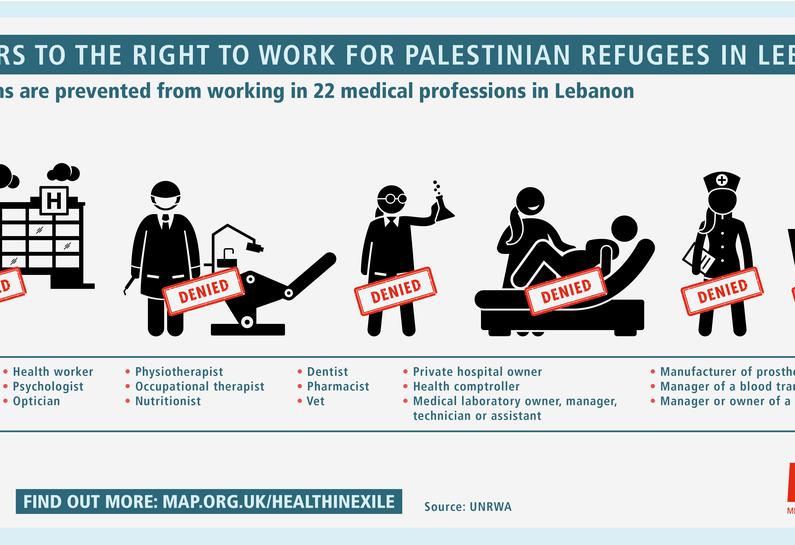
Alia, why did you decide to become a doctor?
I was passionate about medicine as a child. Being able to cure someone or save a person’s life is very rewarding and makes me very happy.
What difficulties have you faced in training to become a doctor?
I was aware of the challenges I would face when I decided to become a doctor, but this did not stop me from pursuing my dream. In Lebanon, when a Palestinian medical student graduates and passes the colloquium exam, she is given a document that states that she is not legally allowed to practice medicine here because she doesn’t have Lebanese nationality.
Parents’ ultimate dream used to be that one of their children would study medicine and become a doctor. This situation has changed. My parents were against me studying medicine. They wanted me to study biology, mathematics, or education for young children in order to be able to work as an UNRWA teacher or kindergarten teacher with one of the NGOs in the refugee camps. Parents want their children to study something that is likely to get them a job later on.
University tuition fees are very high. If I hadn’t got a scholarship, my parents could not have paid for my education.
What job are you doing, where, and for how long?
I am finalising my medical internship at a private Lebanese hospital. I enjoy working at the hospital, but I don’t think they will allow me to work after I finish my internship. There is only one Palestinian doctor in the entire hospital and he is working in the emergency department. Palestinian doctors work illegally. They cannot sign any documents or write prescriptions – which is why you often see them working in emergency departments where signing any prescription is less likely and there are other Lebanese doctors to cover them up. Palestinian doctors working under such arrangements suffer so much injustice. They do not get credit for the good work they do as they work under the name of another Lebanese doctor, and they are often mistreated and exploited.
I also volunteer with an NGO.
Do you have a work permit, and if not why not?
No, I don’t have a work permit and I cannot get one. Palestinian doctors cannot have work permits. The Lebanese government does not allow Palestinian refugees to work as doctors.
Are you paid as much as your Lebanese colleagues doing similar jobs?
For the internship, I am paid the same as other Lebanese interns. However, this is not the case for attending doctors. There is a huge difference in pay and work conditions between Lebanese and Palestinian doctors. Palestinian doctors, despite their competence, are treated as assistants and are expected to accept little pay and difficult working conditions as they are not supposed to be working in the first place. They are never given the opportunity to grow to become equals to Lebanese doctors. Palestinian doctors are not allowed to have a private practice in Lebanon. They open clinics under the name and cover of another Lebanese doctor who can ask for whatever he wishes in return.
Doctors at UNRWA work under very difficult conditions. They see a huge number of patients per day. At PRCS hospitals, doctors are underpaid, and they work with very limited resources.
How much job security do you have?
Not much. I will not be able to continue to work in the hospital that I am currently doing my internship at because I am Palestinian and so not officially allowed to work in a Lebanese hospital.
Would you like to be able to join the doctors’ syndicate?
Yes, I wish I can, but it is not possible for Palestinian doctors to join the Lebanese Order of Physicians. They say that for every 200 Lebanese residents, there is a Lebanese doctor. So, there is no need for additional doctors in the country. To my knowledge, foreign non-Palestinian doctors are allowed to join the Order of Physicians if they pay a $100,000. More work should be done with the Lebanese government to allow Palestinian doctors to work in Lebanon and to join the Order of Physicians.
Do you think that Palestinians should be able to access the Lebanese healthcare system?
I think that the cost of medical care in Lebanon is very high. I believe that if UNRWA and other health providers for Palestinian refugees work together to build good hospitals for Palestinians, it would be more effective than paying for referrals to Lebanese or other hospitals. Over the years, UNRWA and other health providers have paid big amounts of money for the treatment of Palestinian patients in Lebanese or PRCS hospitals. This amount of money could’ve been used to build good hospitals for Palestinian patients.
What are your hopes for your own career?
I would like to specialise in cancer and blood diseases. I hope to be able to go to MD Anderson Cancer Center in USA and study there. Then I would like to focus on related clinical research in Lebanon. I think that cancer is still unclear and we need to know more about the causes to prevent it. The number of cancer patients is increasing, and the cost of treatment is very high. More should be done in this area.
I might consider working for some time at the Emergency Department of a PRCS hospital, because I think a very good doctor is able to save lives regardless of how limited the available hospital resources are.
To find out more read our new report, Health in Exile.
*Name changed to protect identity
Related content
